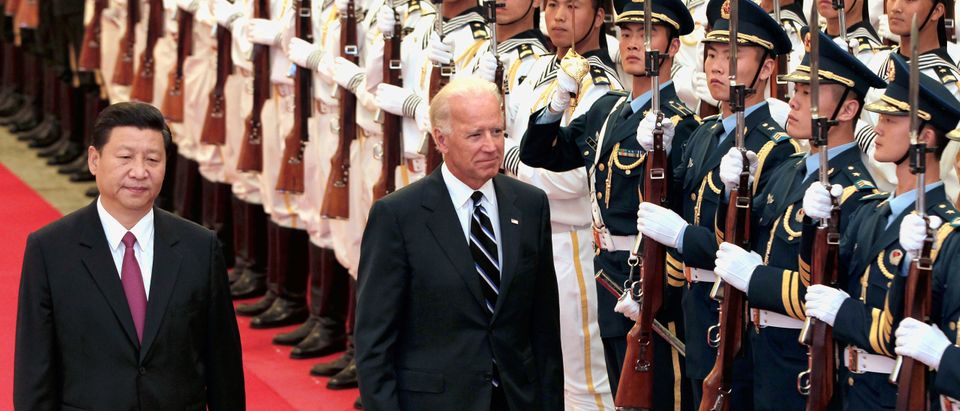Republicans on the House Oversight Committee sent a letter to FBI Director Chris Way alerting him of documents they received that allegedly revealed Jackie Bao, Hunter Biden’s business partner and close personal associate, was linked to and employed by the Communist Party of China (CCP) before he began working for the Biden family. Their letter also expressed unease about Bao’s ties to Tsinghua University, a “recruiting hub for China’s intelligence service.”
“Committee Republicans are concerned Hunter Biden may have been compromised by the People’s Republic of China and foreign intelligence services,” the Republicans wrote in their letter to Wray. “Due to the interconnected nature of the Biden family’s finances and business dealings, this type of access would jeopardize U.S. national security.” They asked the FBI to provide more information about the potential threats her connection to the Biden family may pose to national security.
Some partisans have labeled this letter shameless Republican political maneuvering, but it is far from that. Without question, China’s espionage is a leading national security concern and deserves Congress’ attention.
China has a long track record of spying on the American private and public sectors to acquire sensitive (and often classified) data. It uses this information to give the CCP’s economic, military, and intelligence operations an artificial leg up over the U.S. and other rival nations.
The country’s hired operatives frequently develop personal ties with local and national politicians and the influencers in their innermost circles to increase the accessibility of this coveted information. In the past, China’s targets have included Reps. Eric Swalwell, Judy Chu, and Mike Honda, among others.
Many experts have expressed concern that China also entrenches itself in the operations of America’s businesses for this exact purpose. For example, recent reporting from The Wall Street Journal noted that SpaceX and Tesla CEO Elon Musk’s ties to China, which include receiving over $1 billion in state loans and writing an op-ed for the magazine run by the country’s censorship arm, have created unease among lawmakers, who fear that China may now have an access point to SpaceX’s classified information.
The national security risks posed by China’s spying operation are so severe that in July, the FBI and MI5 — the United Kingdom’s domestic counterintelligence and security agency — shared a public platform for the first time “to send the clearest signal we can on [this] massive shared challenge.” In the three months since these two agencies gave this unprecedented joint warning, the threat has shown no indications of subsiding. In fact, just days ago, the U.S. charged more than a dozen people in China espionage cases. FBI Director Wray stated that “each of these cases lays bare the Chinese government’s flagrant violation of international laws, as they work to project their authoritarian view around the world, including within our own borders.”
Rather than question the motives behind the House Oversight Committee’s investigation into Chinese spies’ potential ties to Hunter Biden, pundits and the general public should encourage Congress to take more expansive actions that address China’s espionage operations more thoroughly and broadly.
Congress should mandate that government agencies divest themselves of contractors who have clear ties to the People’s Republic. Sen. Marco Rubio, Vice Chair of the Senate Select Committee on Intelligence, has introduced a bill that would have NASA do so. Passing this legislation would represent a sound starting point.
But the U.S. government’s response to China’s espionage cannot merely be reactive. It must also be proactive — stopping threats before they even become established. However, according to a recent Senate Intelligence Committee report, the National Counterintelligence and Security Center — the agency that is supposed to lead the U.S.’s defensive operations to China’s spying — does not have adequate tools to perform its Congressionally-mandated functions. Among other concerns, it lacks the authority to mandate response programs for government agencies and private companies targeted by foreign spy services.
In responding to this report’s findings, Sen. Mark Warner, chairman of the Senate Select Committee on Intelligence, said that “new threats and new technology mean that we have to make substantial adjustments to our counterintelligence posture.” He is right. The United States faces a radically different scaled threat today than it did just a couple of decades ago. Congress must respond accordingly by giving the intelligence agencies it created the increased tools and resources they need to remain successful.
So no, Congress is not off base for addressing Hunter Biden’s ties to China, but here’s hoping it represents the first step of many in combating the country’s bold and expansive spying operations over the U.S. Our national security depends on it.
Paul E. Vallely is a retired U.S. Army major general who serves as a senior military analyst for Fox News. Gen. Vallely is the founder and chairman of the Stand Up America US Foundation.
The views and opinions expressed in this commentary are those of the author and do not reflect the official position of the Daily Caller.












